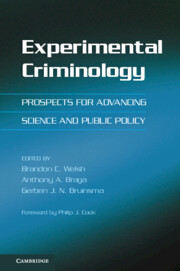Book contents
- Frontmatter
- Contents
- Contributors
- Foreword
- Preface
- 1 Experimenting with Crime and Criminal Justice
- Part I Experimenting with Crime
- 2 Experimental Tests of Criminological Theory
- 3 Experimental Neurocriminology
- 4 Computer Simulation Experiments and the
- 5 Experiments in Guardianship Research
- Part II Experimenting with Crime Prevention and Criminal Justice
- Part III Assessing Research Evidence and Future Directions
- Index
- References
4 - Computer Simulation Experiments and the
Development of Criminological Theory
Published online by Cambridge University Press: 05 June 2014
- Frontmatter
- Contents
- Contributors
- Foreword
- Preface
- 1 Experimenting with Crime and Criminal Justice
- Part I Experimenting with Crime
- 2 Experimental Tests of Criminological Theory
- 3 Experimental Neurocriminology
- 4 Computer Simulation Experiments and the
- 5 Experiments in Guardianship Research
- Part II Experimenting with Crime Prevention and Criminal Justice
- Part III Assessing Research Evidence and Future Directions
- Index
- References
Summary
INTRODUCTION
Recently, a number of scholars have questioned the status of criminological theory, and among other critiques, have lamented shortcomings in its connection to empirical data (Weisburd and Piquero 2008). In hopes of overcoming these challenges, some have presented alternate routes for theoretical development. For example, Wikström (2008) describes the need for the field to focus more on mechanisms and process and Bottoms (2008) highlights the utility of “adaptive theory” where there is a direct linkage between the evolution of ideas and the collection and analysis of empirical data. At the same time, experimental approaches to crime and justice issues are on the rise and some have suggested that they might be carried over to the study of basic theoretical concerns in criminology (see McGloin and Thomas, this volume). Operationalizing these recent suggestions, however, necessitates a well-thought-out framework in which relevant ideas can be put forth, tested, revised, and reevaluated.
Computer technology has, of course, driven substantial enhancements to general productivity and, in many ways, altered the way that those in developed nations live. This technology has also been put to use in a number of scientific fields to assess a variety of important research questions. In criminology the clearest advances to date have come from the increased data storage capacity associated with emerging technology and the enhanced tractability of the intensive estimation procedures embedded in a number of the statistical models utilized in research regularly conducted in the field. At the same time, it is becoming increasingly clear that this technology can be put to other productive uses. As is the case in applied experiments (Eck and Liu 2008), collection of data to assess and refine theory can be quite costly (Bernard 1990).
- Type
- Chapter
- Information
- Experimental CriminologyProspects for Advancing Science and Public Policy, pp. 65 - 89Publisher: Cambridge University PressPrint publication year: 2013
References
- 4
- Cited by

